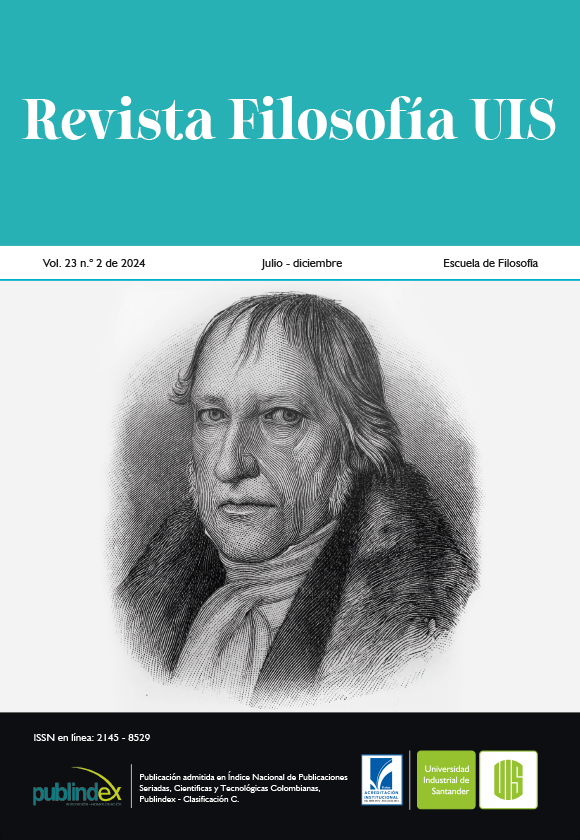The Historical Function of the Homeric Epic Based on Hegel and Detienne
Published 2024-07-31
Keywords
- Dialogic word,
- Epic poetry,
- Greek world,
- Hegelian poetics,
- Homer
- Iliad,
- Secularization ...More
How to Cite
Copyright (c) 2024 Revista Filosofía UIS

This work is licensed under a Creative Commons Attribution 4.0 International License.
Abstract
In Hegel's Lectures on Aesthetics, the epic is presented as a poetic genre that reflects the totality of its historical world. The Homeric poems captured the essentials of reality and also shaped the Greeks' representations of the world and historical self-consciousness. Based on these approaches, this paper focuses on the historical function of epic poetry according to Hegel and its role in shaping ethicity in Greek society, specifically concerning what Marcel Detienne called a “process of secularization”, in which the most important aspects of social and political life in ancient Greece ceased to have their foundation in the system of religious representations and began to depend on deliberation and the dialogical word. Starting from Hegel and in dialogue with Marcel Detienne, the paper aims to examine the manifestation of this process in the epic, through some specific elements of the Iliad, such as the “dialogic word” present in the warriors' assemblies. In the end, we conclude that the epic played a crucial role in the consolidation of secularization, although this implied the loss of the preeminence of those figures who were once directly connected to the divine, including the poet himself.
Downloads
References
- Debernardi Cárcamo, I. (2020). Las lecciones sobre estética de Hegel: discrepancias fundamentales entre la edición de Hotho y los Nachschriften. Aisthesis: Revista Chilena de Investigaciones Estéticas, (67), 9-30. https://doi.org/10.7764/67.1
- Detienne, M. (2004). Los maestros de verdad en la Grecia arcaica (J. J. Herrera, Trad.). Sexto Piso.
- Domínguez Hernández, J. (2008). Arte como formelle Bildung en el mundo moderno en la estética de Hegel. Estudios de Filosofía, (37), 201-221. https://bibliotecadigital.udea.edu.co/handle/10495/2243
- Frankël, H. (1993). Poesía y Filosofía de la Grecia Arcaica (R. Sánchez Ortiz de Urbina, Trad.). Visor.
- Gethmann-Siefert, A. (2006). Prólogo. Sobre los apuntes de Kehler. En G. W. F. Hegel, Filosofía del arte o estética (pp. 7-44) (D. Hernández Sánchez, Trad.). Abada Editores.
- Grave, C. (2007). El conflicto trágico en la estética de Hegel. Ideas y valores, (133), 57-78. https://revistas.unal.edu.co/index.php/idval/article/view/1117
- Hegel, G. W. F. (1989). Lecciones sobre la estética (A. Brotóns Muñoz). Akal.
- Hegel, G. W. F. (2005). Enciclopedia de las ciencias filosóficas en compendio (R. Valls Plana, Ed.). Alianza Editorial.
- Hegel, G. W. F. (2006). Filosofía del arte o estética (D. Hernández Sánchez, Trad.). Abada Editores.
- Homero (2014). Ilíada (E. Crespo Güemes, Ed.). Gredos.
- Huesca Ramón, F. (2020). La forma estética en Hegel: el arte como un vehículo cognitivo. Tópicos Del Seminario, 1(43), 105-121. https://www.topicosdelseminario.buap.mx/index.php/topsem/article/view/663
- Jaeger, W. (1995). Paideia: Los ideales de la cultura griega (J. Xiral, Trad.). Fondo de Cultura Económica.
- James, D. (2006). From the age of heroes to the prose of everyday life: Hegel on the differences between the original and the modern epic [De la edad de los héroes a la prosa de la vida cotidiana: Hegel sobre las diferencias entre la épica original y la moderna]. History of European Ideas, 32(2), 190-204. https://doi.org/10.1016/j.histeuroideas.2005.10.002
- James, D. (2009). Art, Myth and Society in Hegel’s Aesthetics [Arte, mito y sociedad en la estética de Hegel]. Continuum.
- Moreno Medellín, M. (2021). El concepto ópera como un ejemplo de las diferencias entre las versiones propuestas por Hotho y Kehler de las Lecciones de estética de Hegel. Revista de Filosofía, 53(150), 186-201. https://doi.org/10.48102/rdf.v53i150.79
- Moya Ruiz, A. (2017). La religión del arte en el pensamiento estético hegeliano. Pensamiento. Revista de Investigación de Información Filosófica, 73(277), 879–902. https://doi.org/10.14422/pen.v73.i277.y2017.004
- Ordóñez Roig, V. (2013). El progresivo despoblamiento del cielo: la obra de arte espiritual como momento del ateísmo en la Fenomenología del espíritu de Hegel. Astrolabio: revista internacional de Filosofía, (14), 38-52. https://raco.cat/index.php/Astrolabio/article/view/264734
- Szondi, P. (2005). Poética y filosofía de la historia II. Visor.
- Trujillo, I. (2007). Hegel y la desilusión de la historia. En torno a Paul de Man y la tesis del fin del arte. Persona y sociedad, 21(3), 91-107. https://doi.org/10.53689/pys.v21i3.153
- Villacañas, J. L. (1993). Tragedia y teodicea de la historia. El destino de los ideales en Lessing y Schelling. Visor.

